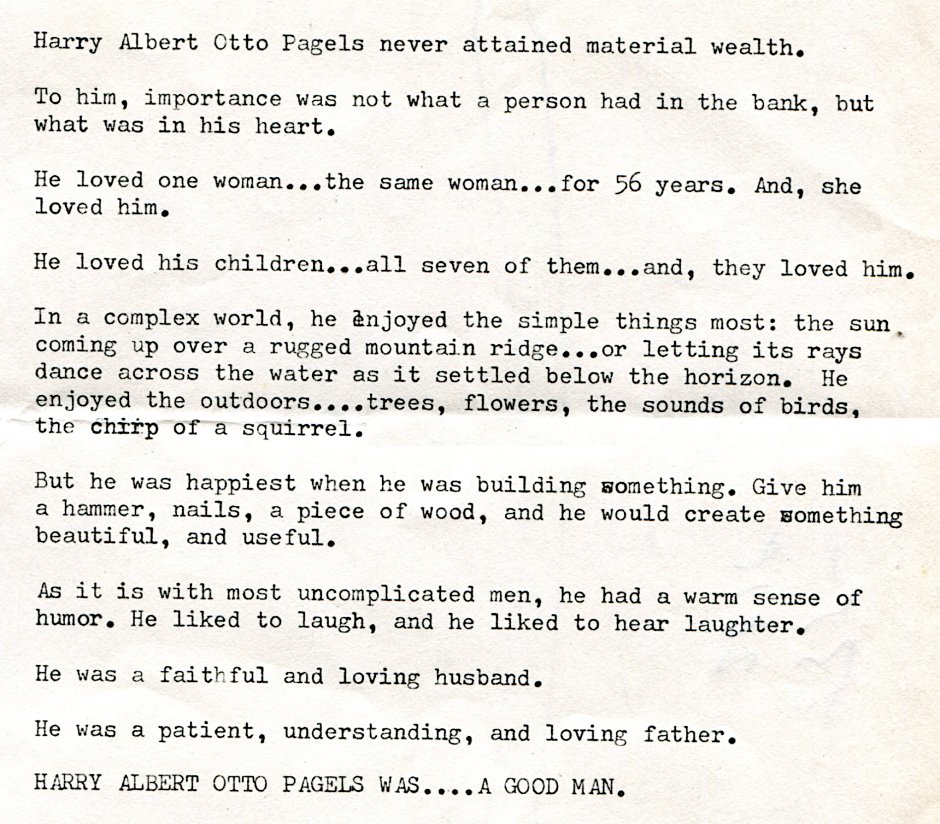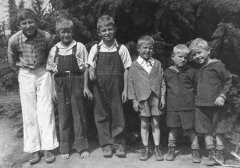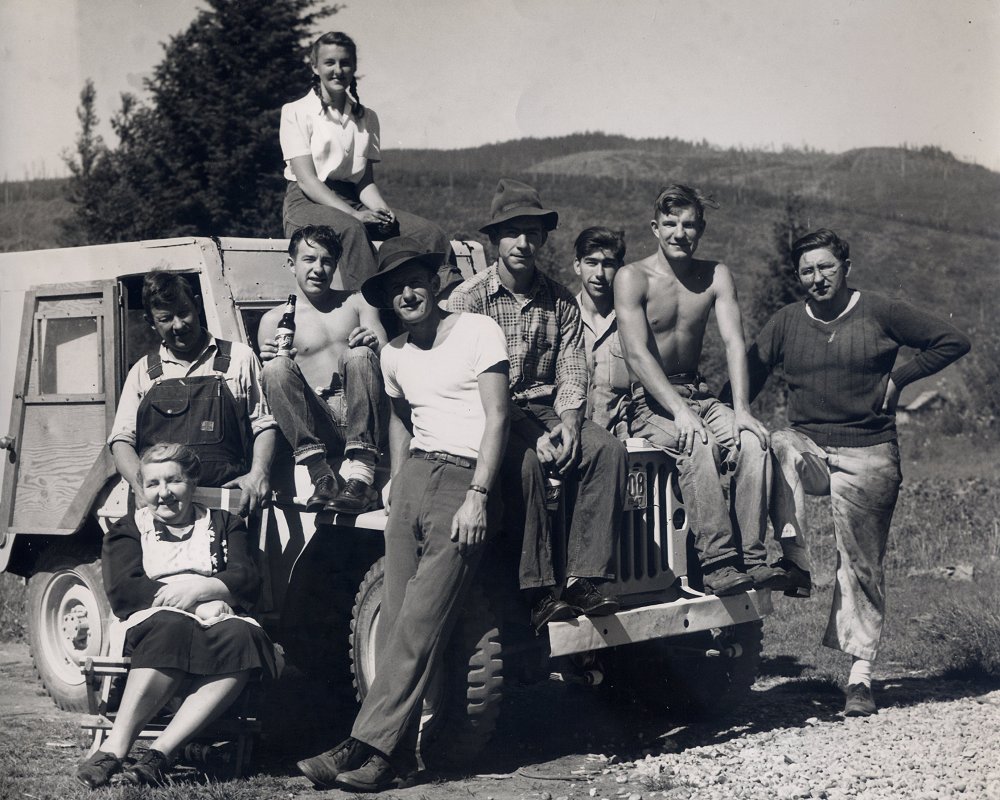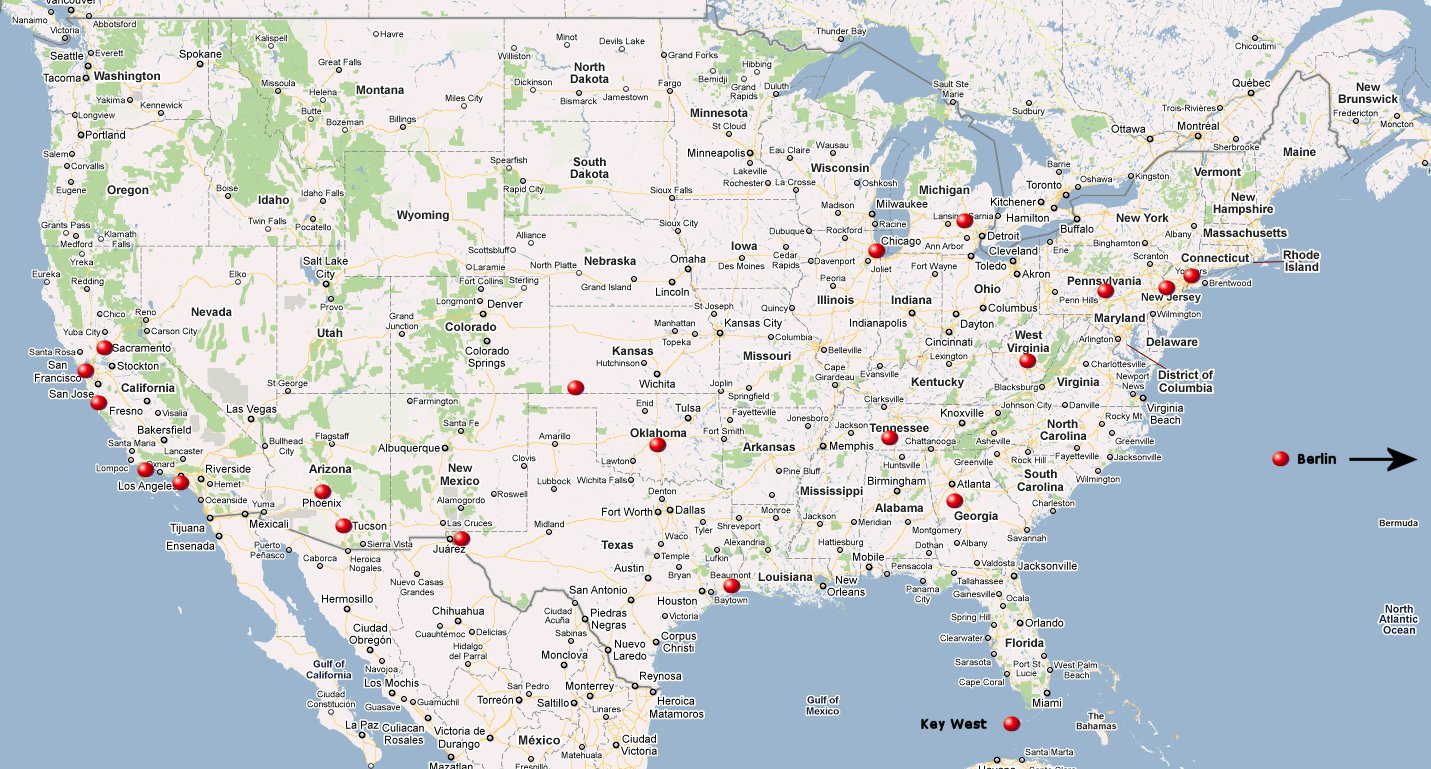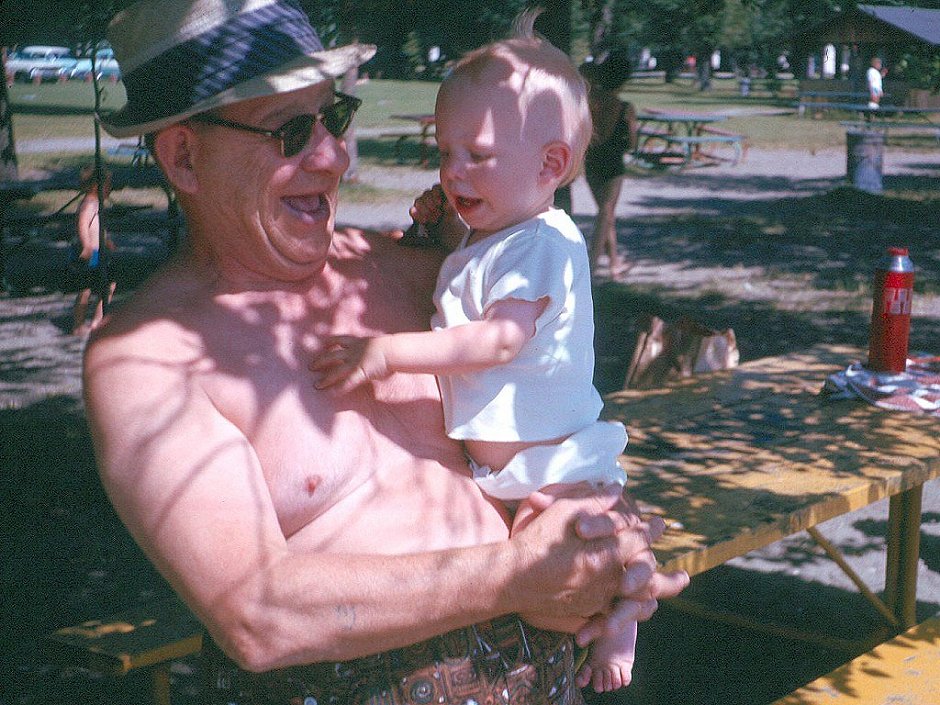|
Pop's Oral History
Click on each tape link to
go to a page that plays that tape and displays photos which help describe
the material on the tape. You can click selectively from here based
on the verbal description of material on each tape. Once you are on
any tape page, links are provided to jump to any other tape page, and back
to this page.
If you haven't already done so, you may be prompted to
download sound-playing software (e.g., Quick Time Plug In). If the player bar doesn't become active, right click on download the tape for each section and open it in a separate tab. It will play there while you go back and view the text-and-photo page from which you clicked.
1.
Tape
1a (23 minutes)
[Right click to download the tape]
a.
Leaves home in Berlin at 14 to work a one-year contract on a
farm. Jumps contract
after three months to return
home; arrested at home, spends 19 days in adult jail.
b.
From 12 to 14, works in Berlin bowling alley while going to school.
c.
Works at a furniture factory until he shoots his finger with six-shooter, walks 6 blocks to Red Cross
station. Then he was fired from the factory.
d.
Goes to Aunt’s restaurant in Hamburg.
e.
At 15 (1910) goes to work about 3 weeks at sea on a
two-masted schooner, which carried wheat to Denmark,
coal, and so on. Pulled
sail, cooked, painted hot tar.
f.
Works on ship to America the same year, jumps ship in New York,
works 12 to 14-hour days on a farm for $10/month, then at hotel in Mt.
Vernon, N.Y., ($15/month) for three months, delivering beer house-to-house
on order. Introduction to funny episode with American girls.
2.
Tape 1b (23
minutes) [Right click to download
the tape]
a.
Funny episode with girls. Trenton N.J., hops train west, hides in sewer pipe when cops
check train for bums.
b.
Trenton, PA, Chicago: hobo on southern rail route to
California (Rock Island line – now the Southern Pacific), shoveled coal
from coal car to boiler man. Stops to work as dishwasher, clean chickens;
meals were 25 cents for full dinner, salary $20/month Stops in Liberal,
Kansas from fall to next year (1911).
c.
Takes wrong track, winds up in El Paso, Texas, then on to Pancho
Villa’s camp in Chihuahua, Mexico, walking along the track. They gave him
frijoles and beans and escorted him in a railroad hand car pumped back to the border.
d.
Benton, AZ: chops wood for meals. Gets
kicked off trains.
e.
Tucson, AZ: dishwasher. Picked up by cops while bumming on
railroad cars, works on sewer line during 5 days in prison.
f.
Goes on to Phoenix, which was a cow town – dirt streets, no wood sidewalks.
Had been told he’d have a better chance of catching trains by going through Tucson
and Phoenix.
3.
Tape 2a
(23 minutes) [Right click to download
the tape]
a.
Rides tank car by hanging onto a hand rail (very dangerous because
had to fight sleep). One more train to San Bernardino, walks to Los
Angeles, works as dishwasher.
b.
Los Angeles: two butter horns and coffee for a nickel. Meets
Fred Nichol, who became a movie director.
Plays convict in a movie, and as a crowd extra in others.
c.
Santa Barbara: Works at Ott’s Hardware as tinner. Lives
with Swedish family for about three years.
d.
Joins Naval Reserve at about 17. Towed targets with tender
for 4-inch gunnery practice. Operated guns, too, and was a good shot. Wasn’t
accepted for regular Navy because of bad eye.
e.
Goes with Swedish family to Los Angeles, later
takes boat to San Francisco. Doesn’t like it, so heads south to Santa Cruz, hops train up to Santa Barbara.
4.
Tape 2b
(22 minutes) [Right click to download
the tape]
a.
Takes train from San Francisco to Santa Cruz as passenger,
but with no ticket. “Fella caught me and took me to the police station
and admonished me not to do that.” Soon after takes train to Santa
Barbara—no ticket again, but wasn’t caught.
b.
This reminds Pop of another trip from Chicago to New York in
which he and a friend rode on top of a “water car” and got dumped with
water. He then hops a Norwegian freighter (1914) with intent of returning
to Germany but he is caught and the Captain kicks him off.
c.
Goes to business school in Santa Barbara while working at
Ott’s.
d.
Delivers goods from Beaumont TX to Tampico(?) Mexico.
e.
(Pop was mixed up logically and chronologically on this
tape, more than on the others.)
5.
Tape 3a (23
minutes) [Right click to download
the tape]
a.
Pays his way as a passenger on a boat from New York to
Charleston, then on to Key West, Florida.
b.
Stays in Key West, Florida for at least 8 months. Ship
captain paid Pop to stay in his house with his wife and mother-in-law, for
protection and odd jobs.
c.
1918. Leaves to work on a farm in Georgia. Experiences
blacks/whites separation on a streetcar.
d.
Kingston, Tennessee, milking two or three cows for $5 a week
plus board and room.
e.
Stops at several other towns, then goes back to Liberal,
Kansas to see what it was like compared with his first stay in 1910. Works
on a farm, slept in room next to stable.
Many changes to Liberal, from dirt streets in 1910 to paved in
1918, and a new high school, where Pop took typing, English.
f.
Gets back pay from Naval Reserve which,
with farm pay, allows Pop to go to high school. Farm
work from 5 am to 8 am, then cleaned up, changed clothes, and went to
school. After school, worked in a restaurant (wash dishes, wait tables,
cook). Stays in Liberal for two years.
g.
Meets some girls and goes back to Tennessee and Oklahoma.
Gets malaria again.
h.
Flint, Michigan: Shipped there by the railroad to work as a
laborer. Works into becoming a
carpenter helping build 700 homes in support of new auto plant. When they
got into finish work Pop quits and goes to New York to ship home to
Germany as a seaman in 1919. First trip home since coming to America in
1910. Learns that both older brothers, Max and Paul, were killed in the
war. He had three sisters, two younger.
i.
On second trip back home Pop meets Mom. Had met Cesar Romero
in class at school.
6.
Tape 3b
(23 minutes) [Right click to download
the tape]
a.
Arrives in Germany just after WW I. Mom talks about how Pop
could have married the farmer’s daughter, because as an American he was
a good catch. But he had already seen Mom with her great legs and was
hooked.
b.
Marries Mom in 1920 but returns to America by himself soon
after. Leaves money for Mom to
live at $2/week. Made 13 trips
back and forth across the ocean as a seaman in years 1920-23, each taking
about six weeks. On this
first return to Germany Pop had come across with his German birth certificate, so Mom
couldn’t return immediately as his American wife. This was a mistake
because he could have signed on with his American seaman’s papers.
c.
In America Pop now had a car (see Tape 4), and his itchy
feet made him leave Mom for long periods as he continued his wandering
ways.
d.
The railroad paid Pop’s way from New York to Sacramento to
work on the railroad as a strike breaker. Eventually works six years for
the railroad, starting with outside construction and working up to finish
cabinet work inside the cars. His supervisor liked Pop because Pop knew
how to play cribbage with him.
e.
Mom comes from Germany with Vernon and $50 from Pop, most of
which was stolen on the train from New York to Sacramento by short
changing her (Mom spoke only German at the time). Arrived in New York
February, 1923.
f.
Pop soon builds their own house in Sacramento. Used
heavy mahogany doors from railroad surplus. He
first built a small house then added onto it (as he did several times
later in the state of Washington).
g.
Mom notices Sunday funnies and learns English with Pop’s help reading them.
7.
Tape 4 (9
minutes) [Right click to download
the tape]
a.
Gus, Otto and Harry are born in Sacramento, where Mom and
Pop live for six years in the house Pop built.
Herb is born during a stay back East. Wally is born after return to
Sacramento. Mary was the only one born in Santa Barbara. Vern had been born
in Germany. At the
then-outskirts of Sacramento, the house was in the country with unpaved
roads and no sidewalks. They
had a cow and a neighbor had a goat, whose milk they shared with the Pagels.
b.
Pop buys his first car, a 1919 Buick, for $50 in 1924.
c.
Pop quits his job at the railroad in Sacramento in 1929,
just before the great depression – ouch, what a bad move.
d.
Mom injures her finger by getting it squeezed by a bedspring
as they were assembling the bed. It
was bone damage and didn’t hurt at first, but became much worse later
with gangrene setting in. Mom went to the hospital while Pop stayed home
with the boys. Pop took one
look at what the hospital had done and took Mom home.
An old sheep herder neighbor wrapped the finger with “loco
weed” (marijuana?) and in three days the finger was clean.
But internal rotting had eaten much of the bone, so the finger was
never fully usable.
|
